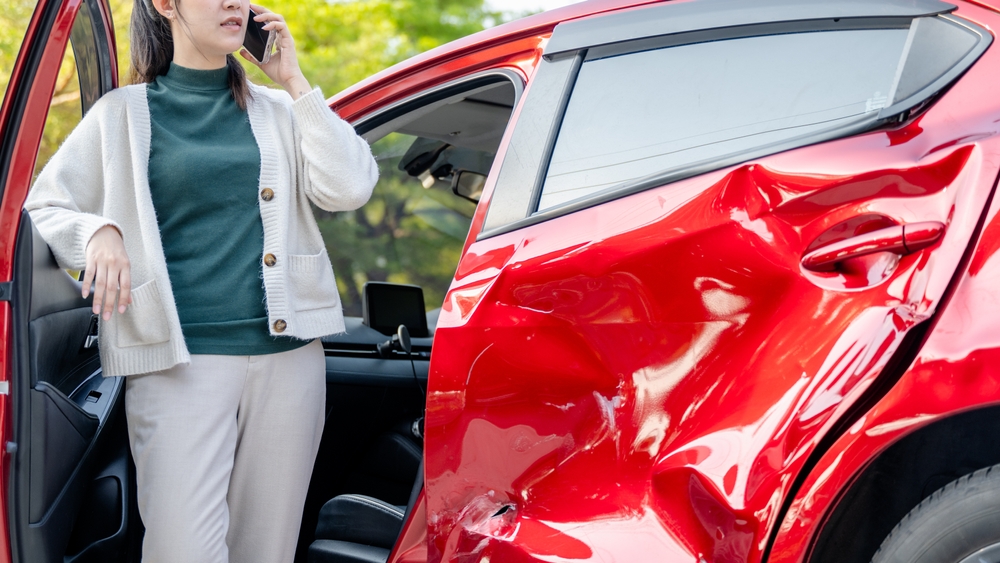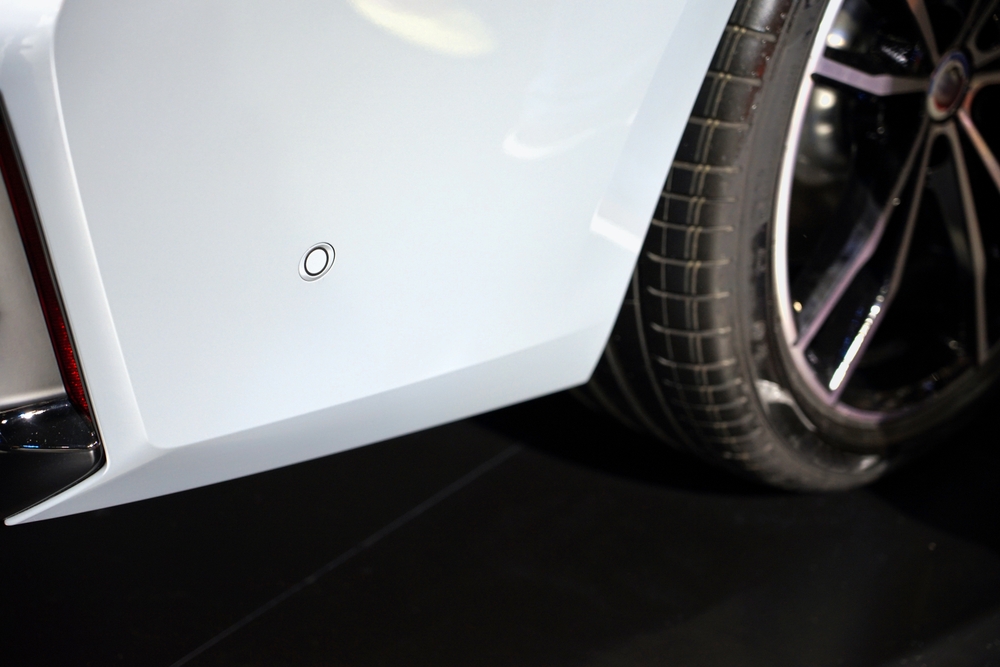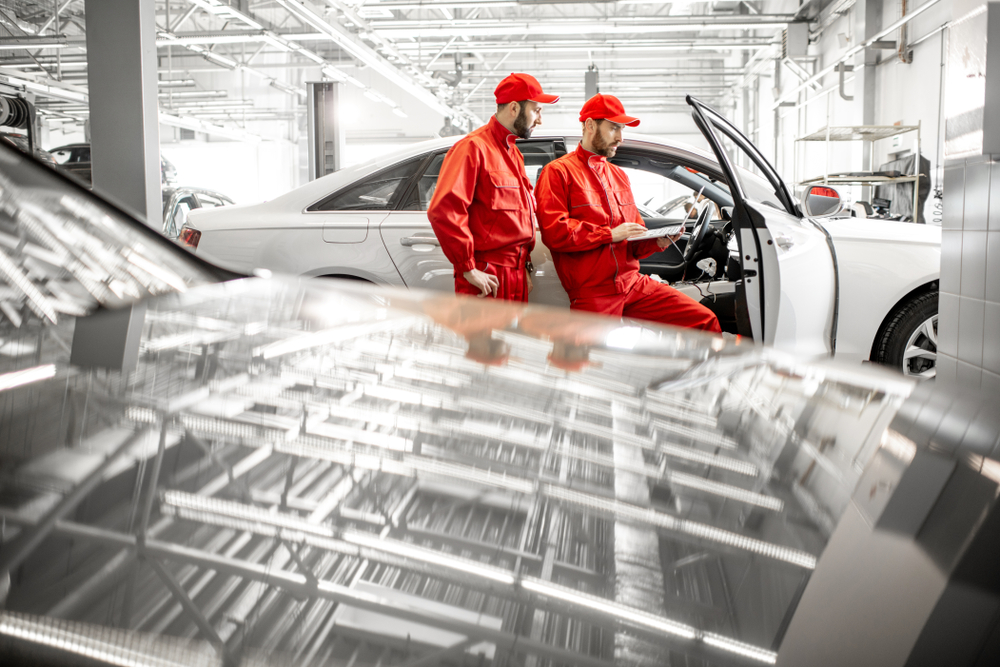Even a seemingly minor fender bender on Airport-Pulling Road or a collision in a busy Waterside Shops parking lot can dramatically compromise your vehicle’s most advanced safety systems. Your car’s sensors and cameras aren’t just sophisticated gadgets—they’re precisely calibrated guardians that constantly monitor blind spots, apply emergency braking, and keep you centered in your lane during those sudden summer downpours that regularly sweep through Southwest Florida. When these systems get knocked out of alignment, they become unreliable safety nets that might fail exactly when your family needs them most.
At Naples Premium Collision Center, we understand that luxury vehicles require factory-level precision in every repair. That’s why we maintain certifications from Porsche, Mercedes-Benz, Audi, Bentley, Rolls-Royce, Maserati, and other premium manufacturers who demand their vehicles be restored to exact original specifications. When your advanced safety systems need attention after an accident, you can’t trust just any shop to get it right.
What is ADAS and Why Do New Cars Rely On It?
Advanced Driver Assistance Systems, or ADAS, represent the cutting-edge technology that transforms your vehicle into an intelligent safety partner. NHTSA defines these systems as technologies that provide “momentary driving assistance, like warnings and alerts, or emergency safety interventions” while you remain fully engaged behind the wheel. Think of ADAS as your car’s sixth sense—constantly scanning the environment around you through cameras, radar sensors, and ultrasonic detectors.
These systems work seamlessly together to create what experts call a “circular safety net” around your vehicle. Your forward-facing windshield camera monitors lane markings and traffic ahead, while radar sensors behind the bumpers track vehicles in adjacent lanes and measure following distances. The technology operates so smoothly that many drivers don’t realize how much their car is actively helping them avoid accidents every single day. Whether you’re navigating the congested intersection at Pine Ridge Road and Airport Road during season or merging onto I-75 during afternoon traffic, your ADAS features are continuously analyzing thousands of data points per second.
Modern luxury vehicles like the Mercedes-Benz, Porsche, and Audi models we frequently service can include features like adaptive cruise control, lane departure warnings, blind spot monitoring, automatic emergency braking, and pedestrian detection. Each system relies on sensors positioned at specific angles and distances to function properly. When even one sensor gets slightly misaligned during a collision, the entire network of safety features can become compromised.
Even a Minor Fender Bender Can Disrupt Your Car’s Most Important Safety Systems
You might think that a light tap in a parking lot or a small rear-end collision at a traffic light wouldn’t affect your car’s high-tech systems, but that assumption could put your family at serious risk. The sensitive radar and camera equipment in modern vehicles is designed for millimeter-precision accuracy, and even seemingly minor impacts can throw these systems completely out of calibration.
Consider what happens during a typical low-speed collision in downtown Naples. The impact might barely scratch your bumper, but behind that bumper sits a radar sensor that measures distances and speeds with incredible precision. If that sensor gets shifted just a few millimeters during the collision, your blind spot monitoring might start giving false warnings or—worse yet—fail to detect a vehicle in your blind spot when you’re changing lanes on busy Tamiami Trail.
The same principle applies to your windshield-mounted camera systems. These cameras are positioned at exact angles to monitor lane markings and detect potential collisions ahead. Even if your windshield doesn’t crack during an accident, the impact can shift the camera’s mounting bracket slightly. This tiny misalignment means your lane departure warning might trigger constantly on straight roads, or your automatic emergency braking might not activate when you actually need it to prevent a crash.
What makes this particularly concerning is that these malfunctions aren’t always obvious immediately after an accident. Your dashboard might not show any warning lights, and the systems might appear to be working normally. However, certified collision repair specialists know that comprehensive diagnostic scanning is essential to identify these hidden problems before they become dangerous situations on the road.
The Dangers of Skipping Recalibration: When Safety Features Become a Liability
Driving with improperly calibrated ADAS systems creates a false sense of security that can prove deadly in emergency situations. When drivers rely on safety features that aren’t functioning correctly, they unknowingly expose themselves and their passengers to significantly higher accident risks. Research from collision repair industry experts shows that improperly calibrated systems can significantly reduce effectiveness, transforming life-saving technology into unreliable equipment.
Imagine you’re driving your family home from dinner at The Ritz-Carlton Golf Resort on a busy Friday evening. Traffic suddenly stops ahead due to an accident, but your forward collision warning doesn’t activate because the windshield camera was knocked slightly off-angle during that minor parking lot incident last week. Without that crucial warning, you might not brake in time to avoid a serious rear-end collision. In this scenario, the very technology designed to protect your family becomes a liability because it failed to perform when needed most.
False alarms present another serious danger that many Naples drivers don’t anticipate. Misaligned sensors can trigger constant warning beeps and dashboard alerts, training drivers to ignore these safety notifications. Over time, this “alarm fatigue” means you might dismiss a genuine emergency warning because you’ve grown accustomed to false alerts. This psychological adaptation effectively disables your safety systems by making you less responsive to legitimate warnings.
The legal implications also deserve serious consideration. If an improperly calibrated ADAS system contributes to an accident, insurance companies and legal professionals will scrutinize whether proper post-collision procedures were followed. Choosing to skip professional recalibration after a collision could potentially affect claims and liability determinations, making it not just a safety issue but a financial risk as well.
Why You Need an OEM-Certified Expert for a Precise Recalibration
ADAS recalibration requires specialized equipment, extensive training, and access to manufacturer-specific procedures that most collision shops simply don’t possess. Each luxury automotive brand has developed unique calibration protocols that must be followed exactly to restore your vehicle’s safety systems to factory specifications. This is precisely why Naples Premium Collision Center maintains official certifications from Porsche, Audi, Mercedes-Benz and other premium manufacturers—we understand that cutting corners on calibration procedures isn’t an option when your family’s safety is at stake.
The calibration process itself involves two distinct methodologies: static and dynamic calibration. Static calibration takes place in our controlled shop environment using specialized target boards and laser measurement systems that position sensors with millimeter accuracy. Dynamic calibration requires driving your vehicle under specific conditions while our diagnostic equipment verifies that all systems respond correctly to real-world scenarios. Our factory-certified technicians understand exactly which approach your specific vehicle requires and how to execute each procedure flawlessly.
Generic scan tools that some shops use simply can’t access the sophisticated diagnostic capabilities required for luxury vehicle ADAS systems. Porsche, Mercedes-Benz, and Audi vehicles contain proprietary software and hardware configurations that require manufacturer-specific diagnostic equipment and software updates. Our investment in genuine OEM calibration equipment ensures that we can communicate directly with your vehicle’s computer systems, updating software and verifying calibration accuracy according to the exact standards your manufacturer demands.
Consider the complexity of calibrating a modern Porsche 911’s adaptive cruise control system. The process requires precise positioning of radar sensors, verification of camera alignment, confirmation of steering angle sensor accuracy, and validation that all systems communicate properly with the vehicle’s central computer. A single mistake in this process could result in unpredictable system behavior that compromises both performance and safety. This level of precision is exactly why manufacturer certifications exist—to ensure that only properly trained technicians with the right equipment work on these critical safety systems.
Our Factory-Approved Process for Restoring Your Vehicle’s Safety
When you bring your vehicle to Naples Premium Collision Center for ADAS recalibration, you can expect a methodical approach that prioritizes accuracy and safety above all else. Our process begins with comprehensive diagnostic scanning using the same equipment your vehicle’s manufacturer uses at their factories. This initial scan identifies every system that requires attention and creates a detailed roadmap for the calibration process.
Our technicians then perform a complete visual inspection of all sensor mounting points, camera brackets, and electrical connections. Even if your collision appeared minor, we check for subtle signs of impact damage that could affect sensor accuracy. This thorough inspection often reveals issues that aren’t apparent to untrained eyes, such as slightly bent mounting brackets or loose connections that could cause intermittent system failures.
The calibration itself takes place in our dedicated bay equipped with state-of-the-art frame alignment and measuring system technology. Using manufacturer-specific target boards and alignment fixtures, we position each sensor and camera to exact factory specifications. Our diagnostic equipment continuously monitors calibration progress, providing real-time feedback that ensures every system meets or exceeds OEM accuracy standards.
After completing the technical calibration, we conduct comprehensive road testing to verify that all systems respond appropriately under real driving conditions. This testing includes verification of emergency braking response, lane departure warnings, blind spot detection, and adaptive cruise control functionality. Only after all systems pass these stringent tests do we consider the calibration process complete and your vehicle safe to return to Naples roads.
Your Post-Collision Checklist for a Safe Return to Naples Roads
After any collision in Naples, regardless of severity, following a systematic approach helps ensure your vehicle’s safety systems are properly restored. Use this checklist to guide your post-accident decisions and protect your family’s safety on Southwest Florida roads:
- Document everything thoroughly: Take photos of all damage, including areas around sensors and cameras, even if they appear undamaged. These images can help technicians identify potential calibration issues during repairs.
- Note any unusual dashboard warnings: Pay attention to any new warning lights or messages that appear after the collision, especially those related to safety systems like lane departure or collision avoidance features.
- Choose a certified collision repair facility: Verify that your chosen shop maintains manufacturer certifications for your specific vehicle brand and has the proper equipment for ADAS calibration.
- Request comprehensive diagnostic scanning: Insist on complete system scans before and after repairs to identify any hidden issues that might not be immediately apparent.
- Test all safety features before regular driving: After repairs are complete, test lane departure warnings, blind spot monitoring, and emergency braking systems in a safe environment before returning to normal driving routines.
- Schedule follow-up appointments: Some ADAS systems require a brief break-in period after calibration, so plan to have systems rechecked if any unusual behavior occurs during the first few weeks after repair.
ADAS System Calibration Requirements
| Vehicle System | Calibration Required After | Calibration Type | Typical Duration | Safety Impact if Skipped |
|---|---|---|---|---|
| Forward Collision Warning | Front-end damage, windshield replacement | Static & Dynamic | 1-2 hours | Delayed or missed collision warnings |
| Lane Departure Warning | Any structural damage, windshield work | Static & Dynamic | 1-2 hours | False alarms or missed lane departures |
| Blind Spot Monitoring | Rear or side panel damage | Static | 30-60 minutes | Undetected vehicles in blind spots |
| Adaptive Cruise Control | Front-end damage, bumper repair | Static & Dynamic | 2-3 hours | Incorrect following distances |
| Automatic Emergency Braking | Front-end collision, sensor displacement | Dynamic | 1-2 hours | System may not activate in emergencies |
Note: Calibration times are approximate and may vary based on vehicle complexity and specific damage. Multiple systems often require calibration simultaneously, which can extend service time.
Frequently Asked Questions About ADAS Recalibration
Q: How do I know if my car has ADAS features?
A: Most vehicles manufactured after 2016 include at least basic ADAS features like backup cameras or blind spot monitoring. Look for buttons or menu options related to lane departure warnings, adaptive cruise control, or collision avoidance systems. If you notice cameras near your rearview mirror or sensors in your bumpers, your vehicle likely has ADAS technology that requires calibration after collision repairs.
Q: Will my insurance cover the cost of ADAS recalibration after an accident?
A: Most comprehensive insurance policies in Florida cover necessary ADAS recalibration as part of collision repairs. We work directly with insurance companies to ensure proper authorization and explain why this calibration is essential for your safety. Our team handles all documentation and communication with your insurer to make the process as smooth as possible.
Q: How long does ADAS recalibration take at your Naples facility?
A: Calibration time varies depending on your vehicle’s systems and the extent of repairs needed. Simple systems might require 30-60 minutes, while complex luxury vehicle calibrations can take several hours. We provide accurate time estimates during your initial assessment and keep you informed throughout the process to minimize any inconvenience.
Q: Can I drive my car if it needs ADAS recalibration?
A: While your vehicle might seem drivable, improperly calibrated ADAS systems can create dangerous situations or provide false warnings that distract from safe driving. We recommend avoiding highway driving and maintaining extra following distances until proper calibration is completed. Your safety systems are designed to protect you, but they can only do so when functioning correctly.
Q: What happens if I replace my windshield? Does that require recalibration too?
A: Absolutely. Windshield replacement almost always requires ADAS recalibration because cameras and sensors mounted to the windshield must be repositioned to exact specifications. Even if the same technician removes and reinstalls the camera, slight variations in positioning can dramatically affect system accuracy. This is why we always include calibration as part of windshield replacement services.
Q: Why can’t I just take my new car to any body shop for this service?
A: ADAS calibration requires specialized diagnostic equipment, manufacturer-specific software, and extensive training that many general repair shops don’t possess. Luxury vehicles like Porsche, Mercedes-Benz, and Audi have unique calibration procedures that require factory certification and genuine OEM equipment. Attempting calibration without proper tools and training can actually make your safety systems less reliable than before the repair.
Schedule Your ADAS Recalibration Assessment Today
Don’t let improperly calibrated safety systems put your family at risk during daily drives around Naples and Southwest Florida. The factory-certified experts at Naples Premium Collision Center are here to restore your vehicle’s advanced safety features to perfect working condition, whether you drive a luxury Porsche 911 or a dependable Mercedes-Benz that’s been serving you reliably for years. We have the right diagnostic equipment, genuine OEM procedures, and specialized knowledge to handle any ADAS calibration efficiently and effectively.
With Naples’ busy traffic patterns on I-75 and sudden afternoon thunderstorms making driving conditions unpredictable, waiting to address ADAS problems only makes the situation more dangerous and potentially more expensive to fix later. Our comprehensive diagnostic approach identifies exactly what your safety systems need, ensuring you get appropriate calibration that restores full functionality rather than just temporary adjustments that fail when you need protection most.
Click here to schedule your post-collision assessment and get back to confident driving!
Or visit us at 3409 Westview Dr, Naples, FL 34104, and let our certified technicians ensure your advanced safety systems keep you protected throughout Southwest Florida’s demanding driving conditions.



